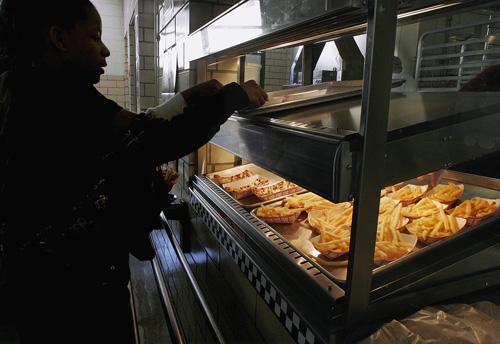Bill banning trans fats in state schools awaiting decision from Illinois Senate

Students eat the food served in the cafeteria during lunch at Washington Middle School in Springfield, Ill., on April 2. Illinois legislators are considering a ban on trans fats in foods served in school cafeterias and vending machines. Seth Perlman, The Associated Press
Apr 11, 2008
Last updated on May 13, 2016 at 09:42 a.m.
SPRINGFIELD, Ill. – Twelve-year-old Vanessa Prather loves her french fries.
The sixth-grader orders her favorite deep-fried side dish at least three times a week when it’s served in the Washington Middle School cafeteria, with no thought to the health problems that can be caused by trans fats.
“No one here cares about that,” Prather said recently as she and her friends downed fries, sausage pizza, baked chips and orange juice at the Springfield school.
Maybe not, but health advocates and some Illinois lawmakers do.
Get The Daily Illini in your inbox!
Illinois could join eight other states in restricting or banning trans fats in schools if lawmakers act on a bill pending in the state Senate. California, Connecticut, Idaho, Indiana, New Jersey, North Carolina, Oregon and Texas have laws on the books, according to the School Nutrition Association, an advocacy group.
“One of the first places children are exposed to trans fats is in our schools,” said Sen. Donne Trotter, D-Chicago, who introduced the Illinois bill. “We think that is the first environment where children should learn good eating habits and the benefits of it.”
Trotter said his goal is to encourage good eating habits in school children, especially those from lower-income families whose only meals are free breakfasts and lunches at school.
Produced when hydrogen is added to vegetable oil, trans fats increase the shelf life and improve the flavor of foods. But they also can raise a person’s level of so-called “bad cholesterol” and have been linked to obesity, heart disease and diabetes.
Nearly 16 percent of Illinois youngsters ages 10-17 are overweight, the 14th highest percentage in the country, according to Trust for America’s Health, a research group that focuses on disease prevention.
Illinois’ bill would require the State Board of Education to eliminate cafeteria food cooked with vegetable oils containing trans fats by July 2009. A year later, all foods with added trans fats from cafeterias, vending machines and a la carte items would be outlawed. Foods with naturally occurring trans fats – including meat, milk and cheese – would be exempt.
But school administrators say a ban on trans fats is unnecessary because state education officials already have set fat and calorie limits for school menus.
“The bottom line is that nobody cares more about the health and safety of students more than the local elected board and they’re there to make these decisions,” said Ben Schwarm, associate executive director of the Illinois Association of School Boards.
The Illinois State Board of Education in 2006 introduced voluntary guidelines on what foods can be sold outside of school cafeterias. Schools also are barred from selling candy and soda during the school day to kindergarten through eighth-grade students.
“We have seen an increase in fresh fruits and vegetables being offered in schools and whole-grain products,” said Roxanne Ramage, a board dietitian. “The shift is there and we’re starting to see some great progress.”
School officials also fear they could face higher costs because oils without trans fats – such as olive and canola – are more expensive, said Sarah Watson, spokeswoman for the Springfield School District. She said the district already has moved to baking more foods.





